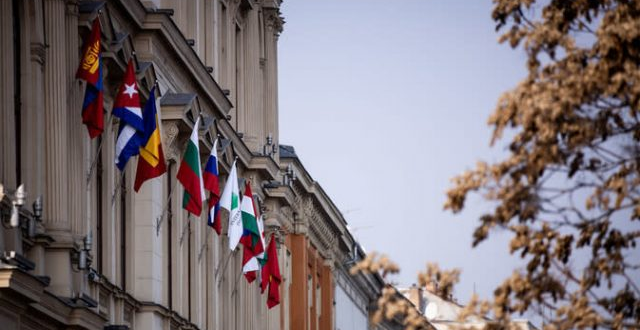The clock is ticking for the Budapest-based International Investment Bank as its desperate search for cash or new shareholders looks increasingly hopeless.
February could prove to be a defining month in the more than 50-year history of the Russian-led International Investment Bank (IIB) – one which a growing number of experts point to as signalling the beginning of the end for this strangest and murkiest of financial institutions.
A casualty of Vladimir Putin’s war in Ukraine, the IIB’s operations have been holed by the international financial sanctions imposed on Russia and the exit of several shareholders from Central and Southeast Europe since the invasion. This has further undermined the Hungarian government’s balancing act of cosying up to Russia, for example by controversially allowing the IIB to establish its new headquarters in Budapest, while also acting as a member of the EU and NATO.
The bad news began on February 17 with a curt statement from the development bank about a “criminal hacker attack” that had resulted “in an unauthorized mass fake email distribution on behalf of certain IIB officials.”
This was then followed on February 25 by some ominous-sounding comments from Orban’s chief of staff, Gergely Gulyas, who in response to journalist enquiries about the viability of the IIB admitted that “it’s in an extremely difficult situation [and] I don’t know if it’s possible to save the bank.”
On February 27, the independent Hungarian news outlet Hvg.hu, citing internal IIB documents obtained through the anonymous hack, said a senior IIB executive had warned in a letter to the bank’s management in mid-December that the bank could soon face insolvency. The assets of the IIB had been frozen by Euroclear – a Belgium-based financial services company that specialises in settling domestic and cross-border securities transactions – after the Russian invasion. In the letter, the executive predicted “such a severe deficit for the first quarter of this year that even the sale of the loan portfolio would not be enough to make up for it”.
Indeed, the leaked documents purportedly show the bank had already begun casting around for help. According to another letter, the veracity of which hvg.hu could not attest to, the Hungarian minister of economic development, Marton Nagy, who represents Hungary on the board of the IIB, lobbied the Belgian finance minister to unfreeze the assets last autumn. But the bank’s hopes were promptly dashed when, in another letter seen by hvg.hu, the Belgian Finance Ministry dismissed the request, arguing that board members were believed to be connected to the Russian government, hence are subject to the European sanctions.
Banking secrecy
While the IIB continues to insist the leaked documents are “fake”, what’s not in doubt are the bank’s well-documented difficulties since Russia’s invasion.
The bank, often referred to as the “Russian spy bank” in the international media due to its association with spies both past and present (the chairman Nikolay Kosov is son of one of the Soviet Union’s most famous spies Yelena Kosova) is a strange creature.
Set up originally in 1970 as a bank for the Soviet Comecon to foster trade and development, it went into hibernation for two decades after 1990, but was revived by Putin in the 2010s, some claim after Cyprus ceased to be a safe haven for connected Russians and oligarchs looking to stash money abroad.
Reviving the bank’s capital through its existing shareholders from the former Eastern Bloc, the bank styled itself as a smaller version of the European Bank for Reconstruction and Development (EBRD) and was supposedly engaged “in medium- and long-term financing of projects aimed at supporting the economic development of its member states that would have a significant positive social, economic and environmental impact.”
“The IIB has an authorised capital of 2 billion euros, which makes it insignificant as a bank,” Andras Racz, a renowned Russia-expert and non-resident fellow at the German Council on Foreign Relations (DGAP), tells BIRN.
Since the bank’s asset are not audited, nobody really knows how much money IIB really handles, but the bank certainly has two huge assets. “It can handle cash, which raises the suspicion of large-scale money laundering. And its Hungarian headquarters enjoy unusually wide immunity: it can invite as many people as it desires who then can travel freely in the [EU’s visa-free] Schengen Area,” Racz explains.
When Russia invaded Ukraine in February 2022, the IIB’s troubles began almost immediately. Besides its assets being frozen by the EU, it was downgraded to junk by the credit rating agencies Fitch and Moody’s. Then four shareholders – Czechia, Slovakia, Romania and most recently Bulgaria – announced they would quit the bank, making Hungary the only EU country staying on board.
“At the very least, after the Russian aggression against Ukraine, the IIB should have been kicked out of Hungary,” Agnes Vadai, an MP and deputy chairman of the opposition Democratic Coalition, tells BIRN. “But, apparently, the Orban government does not want to take any decision that would be uncomfortable for the Russians, they would rather do harm to their own country.”
Hungary has now become the second biggest shareholder in the IIB with 25.2 per cent behind Russia at 45.4 per cent. Cuba, Mongolia and Vietnam control around 5 per cent of the shares. With Romania and Bulgaria’s withdrawal later this year, Russia risks becoming the majority shareholder, meaning it will qualify as a Russian bank and fall under EU sanctions.
The mounting problems were discussed at an IIB board meeting on January 30. The bank reported that the “IIB and Russia agreed to gradually reduce the country’s share in the paid-in capital”. This would mean an automatic increase in the shares of other IIB members states and open up the possibility for others to join.
For some, the logical choice would be Serbia. In 2021, the Serbian government signed a memorandum of understanding to become an IIB shareholder, but there is no evidence it has bought any shares. Imre Laszlocky, deputy chair of IIB’s management board, told the business weekly Figyelo at the end of 2021 that Serbia joining would be a natural consequence of the IIB’s European expansion.
“With regard to Serbia, we have carefully examined the capital market, geographical, social and economic aspects, and we can say that this accession is a very logical step in all respects,” Laszlocky said.
BIRN contacted the IIB and the Serbian government for comment on Serbia becoming a shareholder but received no answer. An insider close to the Serbian government told BIRN that Belgrade is dragging its feet over joining the IIB as it tries not to alienate EU countries at a delicate time in Kosovo-Serbia negotiations. Becoming a member of the IIB would further hurt Belgrade’s image and bring very little in return.
In any case, “Serbia could not save the IIB,” Racz says. “It does not have the money to buy up enough shares, and as a non-EU country, it would not strengthen the IIB’s presence in the EU.”
Theoretically, Hungary could increase its shareholding, but the country’s Finance Ministry is avoiding the issue, in public at least. First, Hungary’s budget finances are in a dire state; second, officials are well aware that any money invested in the IIB is far from a safe bet. The downbeat comments from Orban’s chief of staff, Gergely Gulyas, are seen by many as a move by the government to distance itself from the bank’s fate, though there will still be questions to answer about the 74 billion forints (200 million euros) of public money that the government has already invested in it.
Empty coffers
Experience shows that leaving the IIB is easier said than done. The countries that have withdrawn are finding out that they might have to kiss goodbye to their money – leaked internal documents and emails from the hack published by a group of investigative outlets on Monday apparently show how the bank’s management plotted to avoid paying out any money to the four withdrawing EU member states.
The Slovakian Finance Ministry told the Hungarian daily Nepszava it has been notified by the IIB that it is facing difficulty repaying its money and it could take up to 10 years. The Czech Finance Ministry has complained about a hostile attitude from the IIB and has not ruled out turning to the courts.
“Countries which joined the IIB should have known better,” Racz says. “Poland, which left the IIB after the democratic transition, did not get a dime back. There is simply no payback guarantee in the bank’s regulations.”
For many observers, it is still a mystery as to why the Hungarian government, which left the IIB during the first Orban government in 2000 over “a lack of transparency”, decided to rejoin it in 2015.
When Orban sanctioned the IIB setting up its new headquarters in Budapest in 2018, rumour had it that the Russians initially had their sights set on a building opposite the US embassy in downtown Budapest, but following loud protests from Washington, the Hungarian government offered the IIB a posh building on the other side of the Danube.
The suspicions about espionage that swirl around the bank have never gone away despite management’s strenuous denials. At the bank’s launch press conference in downtown Budapest in June 2019, Kosov, the bank’s chairman, said: “There are no spies in the bank. There are 110 of us, we know each other well. There are no Russian spies, and although we have nine nations represented, there are no spies from other countries either.”
Not all journalists present were convinced. After the press conference, several joked that the background material distributed should be used cautiously, especially the flash drive containing information about the bank.
“It was proven that Hungary allowed in spies under the framework of an earlier golden visa program,“ the opposition politician Vadai recalls. “It is highly possible that a new spy centre was set up under the auspices of the IIB.”
Vadai also points to the Russian employees of the IIB enjoying diplomatic immunity and moving freely inside not only Hungary but elsewhere in Europe, a clear risk to European security.
Orban’s government is now in a bind. Allowing the bank to headquarter in Budapest has harmed Hungary’s image among EU and NATO allies, and the country is rapidly developing a reputation as a hub for Russian spying in Europe. Now the money could be gone, too.
Nor would getting rid of the IIB be a simple fix, even if there were the political will. The so-called IIB law – rumoured to have been written in Moscow but passed with a nod by the Hungarian parliament – advocates no Hungarian authority over the bank. The IIB is not subject to any form of financial or regulatory supervision or control, nor it is obliged to implement any form of accounting standards, and its property and assets are immune to any form of legal process. Moreover, the premises are inviolable and the Hungarian authorities cannot enter the building to perform any official duties, the law states.
It seems that the Hungarians will be stuck with the IIB – even if the bank cannot pursue any meaningful financial activity – until the Russians themselves finally decide to leave.
Vadai thinks it’s simpler, though. “All it would take is a law to revoke the agreement about the headquarters – parliament could pass it in a day,” she says, though adding that, for some reason, the highest echelons of the ruling Fidesz party seem to have a vested interest in maintaining it.
 Eurasia Press & News
Eurasia Press & News




